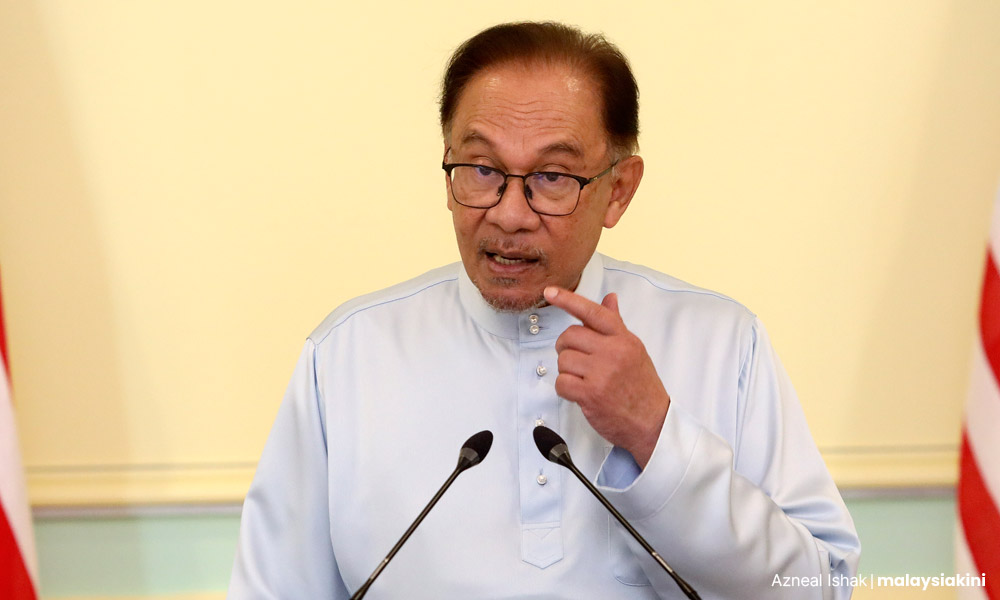Prime Minister Anwar Ibrahim’s decision not to allow any more withdrawals from the Employees Provident Fund (EPF) is the right one to make.
One hopes further that he will let the retirement fund make its decisions without any undue interference from the government anymore.
Perhaps it may cost some politically, but the EPF is the guardian of over 15 million workers’ retirement funds.
Therefore, it should not be used as a football to be kicked around at every incoming prime minister’s whim and fancy to serve his own purposes. Anwar should now lay the ground for EPF’s continued independence.
It was wrong from the very start to allow EPF withdrawals across the board for the downturn caused by Covid-19. Only those who were seriously affected should have been allowed through a vetting process.
Employment figures show the vast majority of people did not lose their jobs so there was no reason to allow withdrawal for everyone, thereby reducing the retirement money for most EPF members.

It was a highly irresponsible move and it was used to the hilt by the previous backdoor governments to pump prime the economy using retirement money.
And it was also a ploy to win election votes. It was a huge sum - RM145 billion - withdrawn which could have gone towards buttressing badly needed retirement funds for the majority of workers.
But even that did not buy Umno its votes as the last general elections showed. A huge RM145 billion was allowed to be withdrawn by over eight million EPF members by the two backdoor governments - headed by Muhyiddin Yassin and Ismail Sabri Yaakob.
I was surprised that Anwar’s coalition government subsequently came up with this scheme to allow loans collateralised with EPF savings, which is worse than anything that had been done to date.
How are they - the majority being as poor as they are - going to pay interest on these loans? Why engage in such ridiculous populist measures?
As I explained in the article “Anwar’s silly plan to use EPF savings to get loans”, the total unemployed as a result of Covid-19 was probably less than 200,000 - 2.5 percent of the eight million who withdrew their EPF money, an overkill of over 40 times!
So, I am glad Anwar has come to his senses and listened to the EPF professionals to stop any further withdrawals.

The politicisation of EPF is unacceptable and it must not be used as a tool to curry favour with voters. It is a retirement fund after all.
Then, there is the proposal that the employer’s EPF share should be raised from 13 percent to 20 percent, especially for employees with a salary of RM4,000 and below.
I am not a fan of employers generally, many of whom have wilfully paid low wages for decades and lobbied successfully for cheap labour from overseas to the detriment of our own labour - to avoid paying fair wages.
But a seven percent one-off effective increase in labour costs may be too much for them to take in one go. Perhaps, spread it out over three years or so.
But the underlying problem behind inadequate retirement savings is basically poor wages.
Figures show that workers’ salaries have not kept up with economic growth even after adjusting for population growth and inflation while income disparities have continued to increase.
That is the problem that the coalition government must address - and it is a difficult one to deal with.
Low wages the real problem
A system of tiered contributions for EPF, where factors such as age and income will determine different rates of contribution, won’t solve the problem for most.
This is because the underlying problem is low wages - successive EPF heads have identified this as the main problem.
In the longer term, you need to give workers fairer salaries and find ways and means of increasing worker productivity through better education and training so this can be facilitated and increased.
You need to cut wastage in the government, get rid of corruption, be more competent, and you need capable people in the right places. There is so much to do and this government has not even started yet.
Figures show that as of December 2022, foreign investment made up about 36 percent of the EPF’s investment assets, and contributed 45 percent of its total gross investment income.
On Monday, Anwar urged the EPF to decrease it to 30 percent, in other words, increase domestic investment from 64 percent to 70 percent.
That would be tying EPF’s hands to some extent. The EPF must be allowed to allocate assets according to the risk profile of their members, who are not uniform.
It needs professionals to do this and this requires independence. It is not the EPF’s brief to make strategic or other investments for the government or country.
Its obligation is to its members and all efforts must be focused on its members’ retirement needs. It is a tough job and no prime minister or finance minister we had so far can handle it without professional help. It’s a job for experts, as with all provident funds.
Remember, EPF is not a sovereign fund for the benefit of the country - it’s a retirement fund for its members, almost all of whom are employees. Their welfare comes first before anything else.
In any case, Anwar is asking the percentage to increase from 64 to 70 percent local investments which is really not a lot.
But it is for the EPF, its board and investment panel, in consultation with experts, both internal and external, to decide this, not the government.
Any kind of government interference in the EPF, except to ensure that it is clean and professionally run, must be regarded as taboo.
To strengthen the EPF and pave the way for increased retirement benefits, the following needs to be done:
Don’t allow further withdrawals from EPF
Ensure workers get fair wages and give the means to make that happen
Consider increasing both employer and employee contribution to EPF over time
Find ways and means to increase economic growth which will raise incomes overall if the growth is fairly distributed
Ensure fair distribution of income and economic growth through wage councils
While there have been proposals to allow parallel private retirement schemes (PRS), these are likely to be beneficial only for those who have no more need for EPF and can bear to take more risks.
It can be allowed for those who have a lot more money than is required for retirement purposes.
Some PRS schemes charge too much for management fees which can eat substantially into returns, especially for those who earn lower and cannot afford to take risks.
The EPF does not charge members management costs and has so far done a superb job in giving good returns with almost no risk.
All the EPF needs now is independence and support from the government through the provision of necessary resources and good people to run the fund.
In the long run, people will appreciate that more than allowing them to fritter away their precious savings through needless withdrawals. - Mkini
P GUNASEGARAM says politicians should shift towards longer-term goals instead of clutching at dubious measures to gain popularity. By now, it should be abundantly clear that Malaysian voters can easily see through deviousness.
The views expressed here are those of the author/contributor and do not necessarily represent the views of MMKtT.



No comments:
Post a Comment
Note: Only a member of this blog may post a comment.